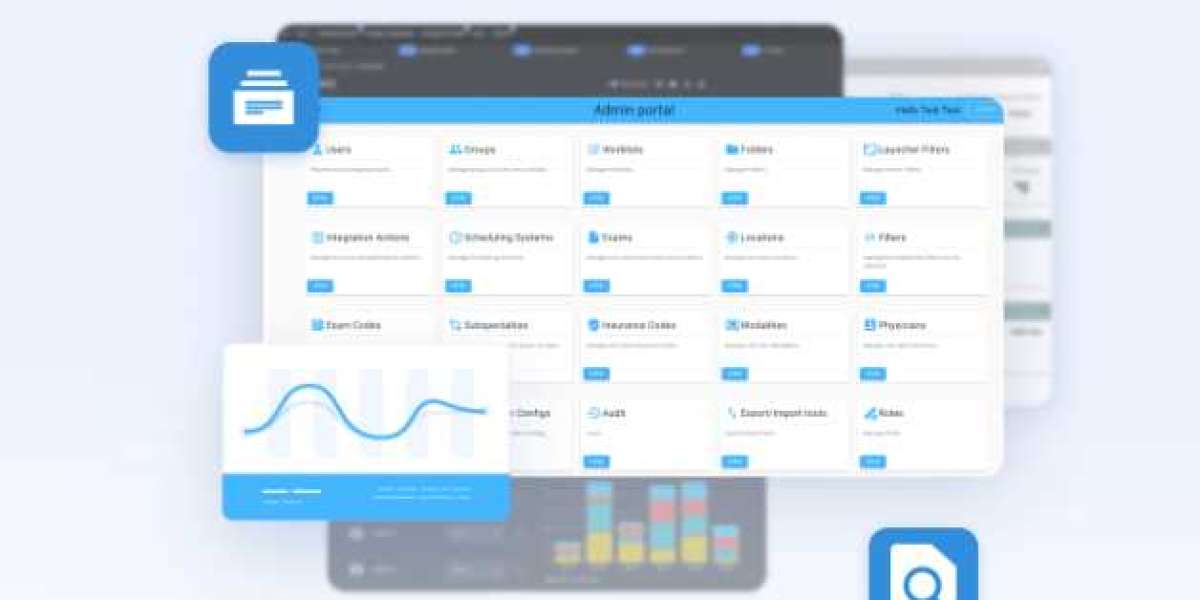In today’s fast-paced business environment, organizations are increasingly relying on data to drive strategic decisions. Companies that can effectively leverage their data gain a significant competitive edge, enabling them to respond to market changes, optimize operations, and maximize profitability. This is where custom ERP software development comes into play. By integrating data across various departments into a unified system, custom ERP solutions empower decision-makers with actionable insights, improving both operational efficiency and long-term planning.
Understanding Custom ERP Software
Enterprise Resource Planning (ERP) systems are designed to integrate core business processes into a single, cohesive platform. Unlike off-the-shelf ERP solutions, custom ERP software development tailors the system specifically to a company's unique processes, requirements, and objectives. This personalization ensures that the software aligns seamlessly with existing workflows, providing precise, relevant, and timely information for decision-makers.
Custom ERP software can be designed to handle everything from finance, procurement, and supply chain management to human resources, customer relationship management, and production planning. By consolidating all business data into a centralized system, it reduces redundancy, minimizes errors, and ensures that data is always accurate and up-to-date.
The Role of Data in Modern Business
Data has become the backbone of modern business strategy. Organizations generate enormous amounts of information daily, ranging from sales transactions and customer interactions to inventory levels and employee performance metrics. However, raw data alone is not sufficient. To truly benefit, businesses need to analyze, interpret, and transform this data into actionable insights.
Data-driven decision-making allows companies to:
Identify trends and patterns in customer behavior.
Predict future market demands.
Optimize resource allocation.
Reduce operational costs.
Enhance overall productivity and profitability.
Without a robust system to manage and analyze data, businesses often struggle with fragmented information, slow reporting, and decisions based on incomplete or inaccurate data. This is where custom ERP software becomes a game-changer.
How Custom ERP Software Enhances Data-Driven Decision Making
1. Centralized Data Management
One of the most significant advantages of custom ERP software is centralized data management. In most organizations, departments maintain their own isolated systems for tracking operations. This siloed approach makes it difficult to gain a holistic view of the business, often leading to inconsistent or conflicting information.
A custom ERP system integrates all departmental data into a single platform, ensuring that decision-makers have access to comprehensive, real-time information. Finance, operations, sales, HR, and supply chain teams can share data seamlessly, reducing duplication and improving accuracy. Centralized data enables executives to make informed decisions quickly, based on a complete and unified picture of the organization.
2. Real-Time Analytics and Reporting
Custom ERP solutions are equipped with advanced analytics and reporting tools that provide real-time insights into business performance. Instead of waiting for monthly reports or manually compiling data from multiple sources, managers can access dashboards and reports instantly.
Real-time analytics allows organizations to:
Monitor key performance indicators (KPIs) continuously.
Detect issues and inefficiencies as they occur.
Adjust strategies proactively to maintain optimal performance.
For example, a manufacturing company can track production metrics, inventory levels, and supply chain status in real-time, allowing managers to anticipate potential bottlenecks and make adjustments before problems escalate.
3. Tailored Decision-Making Tools
One of the main benefits of custom ERP software development is the ability to design decision-making tools that align perfectly with business needs. Unlike generic ERP solutions, custom systems can include specialized dashboards, predictive analytics modules, and reporting tools that focus on the metrics most relevant to a particular organization.
These tailored tools help executives prioritize decisions, identify growth opportunities, and assess risk accurately. For instance, a retail company might need predictive analytics to forecast seasonal demand, while a healthcare organization may require detailed patient and resource tracking for compliance and operational efficiency.
4. Improved Forecasting and Planning
Accurate forecasting and planning are crucial for sustaining business growth. Custom ERP software enhances these processes by consolidating historical data, identifying patterns, and applying predictive analytics. With a robust ERP system, companies can forecast sales, manage inventory, and plan production more efficiently.
This predictive capability reduces the likelihood of overstocking or stockouts, optimizes workforce planning, and ensures that financial resources are allocated effectively. By basing strategic decisions on reliable forecasts, businesses can minimize risk and capitalize on emerging opportunities.
5. Enhanced Collaboration Across Departments
Data-driven decision-making often requires input from multiple departments. Custom ERP software breaks down communication barriers by providing a shared platform for collaboration. Teams can access the same data, communicate within the system, and track changes in real-time, fostering transparency and alignment across the organization.
Enhanced collaboration ensures that decisions are informed by a holistic understanding of the business. For example, a product launch might involve marketing, sales, logistics, and finance teams. By accessing a centralized ERP system, these departments can coordinate effectively, resulting in smoother execution and better outcomes.
6. Automation and Efficiency
Custom ERP systems can automate repetitive tasks such as data entry, report generation, and workflow management. Automation not only reduces errors but also frees up employees to focus on higher-value activities, such as strategic analysis and decision-making.
By automating routine processes, businesses can ensure that decision-makers have access to accurate, up-to-date information without manual intervention. This efficiency accelerates the decision-making cycle and enhances the organization's responsiveness to market changes.
7. Compliance and Risk Management
Data-driven decisions must also consider regulatory requirements and risk factors. Custom ERP software can incorporate compliance management features, audit trails, and security protocols, ensuring that all decisions are made within the bounds of legal and regulatory standards.
For example, in the pharmaceutical or financial sector, a custom ERP system can track sensitive data, generate compliance reports, and alert management to potential violations. This proactive risk management supports informed decision-making and protects the organization from costly penalties.
Industry Applications of Custom ERP for Data-Driven Decisions
Manufacturing
In manufacturing, custom ERP software helps track production schedules, inventory levels, and equipment performance. Real-time insights allow managers to optimize production, reduce waste, and meet delivery deadlines efficiently. Predictive analytics can forecast equipment maintenance needs, preventing costly downtime.
Retail
Retailers can use custom ERP systems to analyze customer purchasing behavior, manage inventory across multiple locations, and optimize pricing strategies. Data-driven insights support marketing campaigns, stock replenishment, and customer engagement initiatives.
Healthcare
Healthcare providers benefit from custom ERP solutions by managing patient records, staffing schedules, and supply chains in a unified system. Data analytics enables hospitals and clinics to optimize resource allocation, improve patient care, and comply with regulatory requirements.
Finance
Financial institutions rely on data-driven decision-making for risk assessment, fraud detection, and investment strategies. Custom ERP software integrates transactional data, client information, and market trends to provide comprehensive insights for informed financial decisions.
Supply Chain and Logistics
Custom ERP software enhances visibility across the supply chain, allowing companies to track shipments, manage inventory, and optimize delivery routes. Real-time data enables proactive problem-solving, reduces delays, and improves customer satisfaction.
Choosing the Right Custom ERP Software Development Partner
To fully leverage the benefits of data-driven decision-making, organizations must choose the right partner for custom ERP software development. The ideal partner should have:
Expertise in building industry-specific ERP solutions.
Strong understanding of data analytics and reporting tools.
Experience integrating ERP systems with existing business processes.
Ability to provide ongoing support, updates, and scalability options.
A competent ERP development partner will collaborate closely with your organization, ensuring that the system aligns perfectly with business objectives and supports strategic decision-making.
Challenges and Considerations
While custom ERP software offers significant advantages, organizations must be mindful of potential challenges:
Cost and Time: Developing a custom ERP system requires an initial investment and a longer implementation timeline compared to off-the-shelf solutions.
Change Management: Employees may resist adopting new systems. Proper training and support are crucial for a smooth transition.
Data Migration: Consolidating data from multiple sources can be complex and must be managed carefully to avoid errors.
Continuous Optimization: To remain effective, custom ERP systems require regular updates and optimization to adapt to changing business needs.
Despite these challenges, the long-term benefits of enhanced data-driven decision-making often outweigh the initial investment and effort.
Conclusion
In an era where data drives competitive advantage, organizations cannot afford to make decisions based on incomplete or outdated information. Custom ERP software plays a pivotal role in enabling data-driven decision-making by centralizing information, providing real-time analytics, and supporting tailored decision-making tools. From improved forecasting and planning to enhanced collaboration and compliance, the benefits of a custom ERP system extend across all facets of business operations.
Investing in custom ERP software development ensures that organizations have a system designed specifically for their needs, capable of transforming raw data into actionable insights. By leveraging these capabilities, businesses can make informed decisions, optimize performance, and maintain a competitive edge in an increasingly data-driven world.







